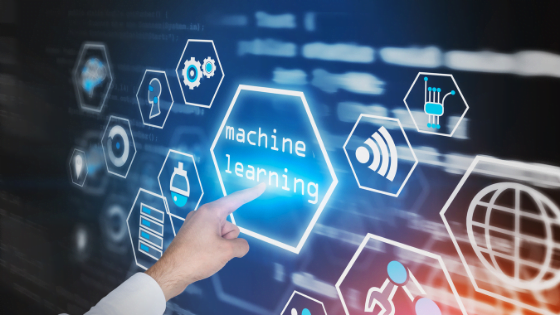6 Best Use Case of Machine Learning in Manufacturing

The use of machine learning in manufacturing is one of the most radical innovations of technology in recent years.
This is a new innovation in the field of tech that has revolutionized entire industries across the globe and continues to do so at an increasing pace.
So here we will deep dive into what machine learning means for manufacturing and how it is being used today by manufacturers across businesses and industries.
What is machine learning in manufacturing?
Machine learning is a subset of artificial intelligence that allows computers to learn from data without being explicitly programmed.
This technology improves the efficiency of manufacturing processes by predicting faults and problems before they occur.
Machine learning is used to create models of how products are made, which can help manufacturers optimize their production lines.
Therefore this technology can be used in manufacturing to improve efficiency and predict outcomes for processes.
Machine learning can also help identify patterns in data that may not have been noticed before.
Machine learning algorithms are used to build models that can identify patterns, trends, and anomalies in the data, which can then be used to optimize the manufacturing process, reduce costs, and improve product quality.
It can be used in various areas of manufacturing, including predictive maintenance, quality control, supply chain optimization, and process control.
Why is machine learning important for manufacturing?
With so much available data at hand, your company also needs something that will do the work of computation and analysis of the data for you.
Thus, with the increasing complexity and quantities of data, you need to harness a system that can efficiently deliver the analysis precisely and at a faster rate.
Therefore, you need to rely on an efficient machine learning procedure that is going to make the work easier for you.
Through such efficient analysis, your company would also be able to understand and figure out potential risk factors and eliminate them from your path.
Even the comprehensive knowledge of what are the chances where your company may profit the most also becomes clear through such analysis via machine learning.
According to various case studies and reports, machine learning in the manufacturing sector alone is going to rise up from $1 billion in 2018 to nearly $16 billion by 2025.
Now that you understand the value of machine learning systems in the backdrop of technological innovation, let us see how it helps the manufacturing industry in particular.
6 Best Use Cases of Machine Learning in Manufacturing
There are several ways in which the evolution and growth of machine learning have left behind a lasting impact on the manufacturing industry.
Here, we have showcased before you some of the topmost ways in which the impact can be felt.
1. Regulation of surplus production
A study that came out in the Material, Handling and Logistics Magazine revealed that several US companies incur a loss of approximately $1,71,340 annually.
It happens largely due to repetitive and mundane tasks, like looking at order numbers, calculating a number of orders, etc.
Machine learning can enable you to analyze and have a comprehensive view of the required amount of produce that is needed. It helps in the efficient management of your inventory and helps in striking the right balance between your supply and demand.
With the effective use of machine learning, manufacturers regulate production in real-time and avoid producing surplus goods.
In addition, machine learning can also predict future demand and help plan production schedules accordingly.
This not only results in increased efficiency but also helps to reduce waste and keep costs under control.
A case study shows how Continental, a German automobile supplying company, uses machine learning to predict the approximate time of tire changes in commercial fleets.
With the use of machine learning, it is now able to optimize the stocking up of tires on time and even reduce the heavy maintenance costs!
With the implementation of machine learning, even the analysis and reports that are produced possess hardly any error.
Furthermore, over time, as demands in the market also change, machine learning can be used to project future demand with the help of the existing data points.
It, in turn, can enhance your supply chain as well since you have the demands of your customers clear before you.
2. Boost up the quality of production
Usage of manual labour for quality control at any business is gradually becoming a redundant idea.
Though you may still be using the conveyor belt, an idea that came up during the industrial revolution, a change is necessary for its components.
Having your workers stand on both sides of the conveyor belt to manually search for faulty products and eliminate them is not just tedious but is also unessential.
With the coming of machine learning systems, this task is executed at a faster and more efficient rate.
The usage of human labour to identify faults and defects can take a lot of time.
Instead, your company can now harness the visual inspection factor of machine learning systems and use the manual labour resources for more nuanced tasks.
Machine learning can seamlessly identify defects in your products simply by way of recognizing a certain pattern in them.
Also, using machine learning to detect faults at an earlier stage of manufacturing, where manual verification is impossible, can reduce the wastage of resources.
According to Forbes, machine learning could help improve the identification of defects by as much as 90%.
BMW, a renowned car manufacturing brand, is known to use machine learning in its manufacturing processes to seek out any form of defects in its production and to continue producing cars of standard quality.
It has also even been found that not only will machine learning help you to identify faulty products, but it does so much more!
Starting from giving you the details of the faults to providing you with an understanding of how such faults may be prevented – the possibilities are endless!
3. Bridge better relationships with customers
Maintaining good customer relationships is certainly one of the key factors to boosting your sales and improving your reputation.
Without the support of your customers, your company cannot possibly hope to increase its reach.
And this is where the efficient use of machine learning systems can help you elevate your relationship with your customers with ease!
Machine learning can be designed efficiently to provide automated customer services to your customers.
Now with the use of machine learning thus, you don’t have to worry anymore about recruiting workers to engage with your customers.
Machine learning is here for you!
With the greater accuracy and faster pace with which it answers the queries of your customers, there is no doubt whether it is the best!
Reports reveal how Dell immensely benefited by implementing machine learning to enhance its overall marketing.
After it joined hands with Persado, a leading technology in machine learning, Dell discovered an approximate increment of 46% in its customer responses earlier.
Furthermore, it did not just come to a halt there but moved on to a 22% hike in page visits and a 77% increase in the number of items that customers added to their carts.
The data speaks for itself in showing how machine learning helped forge better customer relations.
Additionally, machine learning gives you access to easy ways of computing the changing market trends.
This technology makes the collection of relevant data tied to varying customer demands, as well as an analysis of the same much easier and less labour-intensive.
Thus, now your company can even think of modifying its product in keeping with the changing market trends.
4. Predictive maintenance
Manufacturing is such a field where the term “quality control” does not only refer to the end products but also to the products that are being used in the production process.
If there is a fault in one or more of your devices, it can lead to serious problems within the end products.
And even lower their quality to such an extent that they might not even meet the basic market standards.
When such a fault occurs in any of the devices, it not only wastes resources but also costs you a huge loss because the new batch of products that have come out will eventually need to be discarded or sold at dirt-cheap rates.
With the efficient use of machine learning, running maintenance examinations on your devices is now a pocket-friendly affair!
You would be amazed to know; how great machine learning can be to even predict which of your devices need to be serviced immediately.
For instance, Mondi, a packaging and paper goods manufacturer, has recently started implementing machine learning in monitoring the health of its devices and in predictive maintenance.
It helps in identifying potential issues in the equipment.
Thus, maintenance costs can be reduced significantly as you start using machine learning today!
So now, you can easily take down that particular device for a servicing session and return with the device restored in its earlier stage!
Thus, you would now be able to ensure that your company continues to produce the best quality of products without any lax in the system.
5. Low electricity consumption
The most common way in which almost any manufacturing company might be spending most of its finances would probably be by paying those huge electricity bills!
But the manufacturing sector cannot certainly do without the use of a sufficient number of machines, most of which run on a high-power supply.
The increasing surge of power supply, as required to run your machines at the optimum level, can easily make your electricity bill swell beyond control.
However, there are solutions to effectively reduce the electricity consumption in your factory or workshop.
Companies can level up their production rates when the power supply rates are considerably cheaper to reduce electricity consumption to some extent.
But for this, human labour alone might not be efficient.
Instead, you can rely completely on machine learning to optimize your resource usage.
Analyzing the time when energy-intensive tasks may be undertaken under rates of power supply can be done in no time with the help of this technology.
For instance, ABB, a Swiss industrial company, has come together with Silicon Valley AI specialists to do the same.
They are now using machine learning to identify peak hours during the day and thus stray away from immense electric consumption.
However, as mentioned earlier, the possibilities that open up with the use of machine learning in the manufacturing industry are quite endless.
They are in no way limited to being useful just inside the boundaries of your factory but rather go beyond it. So now, let’s have a look at how you can use machine learning in your manufacturing company outside the walls of the factory.
6. Enhance supply chain management
What will you do if you do not receive sufficient supplies of raw materials for your workshop on time?
With markets becoming as competitive as ever, the need to have reliable and resourceful supply chains is essential.
There can be so many wide-ranging factors that can cause a sudden drop in your supply chains.
The stormy weather can prevent the shipment trucks from reaching your facility; there might be an accident that took place on the road, and so it goes on.
But no matter what the case might be, you would still need those supplies earnestly. So, what would you do then?
However, we need not worry; machine learning technology is here to save the day!
With the proper implementation of machine learning, your company can now compute almost anything to prevent the possible delay of supplies.
Whatever may be the situation that has blocked your supplies can be readily optimized by it.
From analyzing the possible time that might be required to ship your products to computing weather patterns to knowing the possible delay, it can do a lot for you.
A study shows how Carlsberg is using machine learning and the data handled by the same method to develop new beers and even to enhance the qualities of the existing ones.
Boeing is known to use machine learning to scan the impregnable areas of an aircraft to thereby detect any kind of defect that might be lying therein. This, in turn, helps the company to enhance its supplies.
Frequently Asked Questions:
a) How does machine learning benefit the manufacturing industry?
The benefits that manufacturing industries are bound to harness with the use of machine learning are quite limitless.
From better regulation of finished products to assuring proper quality checks, to maintaining the manufacturing devices at regular intervals, there is so much that it promises!
b) Which industries are benefiting the most from machine learning?
Different industries adapted to this new technology in different phases.
While manufacturing and automotive industries were some of the earliest ones to pick it up, industries such as food and beverage, healthcare, and advertising caught up to the trend gradually.
c) What is the goal of using machine learning in manufacturing?
The goal of using machine learning in manufacturing is to optimize the manufacturing process, reduce costs, and improve product quality by analyzing and understanding data generated during the manufacturing process.
d) What are some examples of applications of machine learning in manufacturing?
Some examples of applications of machine learning in manufacturing include predictive maintenance, quality control, supply chain optimization, and process control.
e) What kind of data is used in machine learning in manufacturing?
f) How is machine learning used in predictive maintenance?
g) How is machine learning used in quality control?
Machine learning is used in quality control in manufacturing by analyzing data from product inspections to identify defects and improve product quality.
h) What are some benefits of using machine learning in manufacturing?
Some benefits of using machine learning in manufacturing include increased efficiency, reduced costs, improved product quality, and reduced downtime.
i) Are there any challenges to implementing machine learning in manufacturing?
Yes, there are some challenges to implementing machine learning in manufacturing, including data collection and management, data privacy and security, and the need for specialized skills and expertise.
j) Can machine learning help reduce waste in manufacturing?
Yes, machine learning can help reduce waste in manufacturing by identifying areas where waste occurs and optimizing the manufacturing process to reduce waste.
Conclusion:
Science and technology have evolved immensely and continue to evolve with changing times.
The increasing innovation that this brings has resulted in making almost every step of manufacturing so much more efficient, easier, and simpler than ever before!
With artificial intelligence indulging in industrial processes, the results have proven to be much more precise and accurate. Several big companies like Microsoft, Siemens, Intel, Bosch, and others have started investing in it.
Machine learning is surely revolutionizing the manufacturing industry significantly and does hold immense promise for the future to behold!



